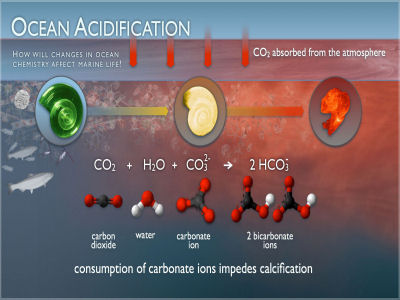Ocean Acidification

As CO2 reacts with seawater it forms carbonic acid, causing a reduction in seawater pH. Seawater is naturally 'buffered' against these pH changes, but the buffering process consumes carbonate ions. Carbonate ion is an essential ingredient in the creation of calcium carbonate shells and skeletons produced by a large number of marine organisms (e.g., corals, marine plankton, coralline algae, and shellfish). Carbonic acid is formed as a result of dissolving CO2 in water. In seawater, some of the acid (H+) is consumed by reacting with carbonate ion (CO32-) to form bicarbonate ion (HCO3-). Thus, ocean acidification not only reduces surface ocean pH, but also reduces the availability of carbonate ion. The term Ocean Acidification is new, but the concept has been recognized for more than three decades. Trends toward lower pH can now be clearly seen in sustained observations recorded at ocean time series stations and during repeated geochemical surveys. In coming decades, ocean acidification could affect some of the most fundamental biological and geochemical processes of the sea. Dr. Rik Wanninkhof's Ocean Acidification Southeast Ocean and Coastal Acidification Network (SOCAN) Webinar "A Far-Field View of Ocean Acidification in the South Atlantic Bight". Current projects being conducted by OA are: 1. Oceanic, Coastal and Estuarine Ocean Acidification Observing Networks: North Atlantic Ocean, East and Gulf Coast. The development of the North Atlantic Ocean, East and Gulf Coast ocean acidification observing system in response to the requirements of the Federal Ocean Acidification Research and Monitoring (FOARAM) Act. 2. The National Coral Reef Monitoring Plan and Ocean Acidification Program. At AOML, the National Coral Reef Monitoring Plan, in partnership with NOAA's Ocean Acidification Program, is monitoring the status and trends of climate change and ocean acidification on U.S. coral reefs. 3. Ocean Acidification Global Modelling and Coral Bleaching. Using state of the art fully coupled climate models, both the stresses of bleaching and ocean acidification on coral reefs are analyzed globally. 4. Coral Growth and Reef Framework. Characterizing and quantifying the differences in the processes of coral reef construction (coral growth, carbonate cementation) and destruction (bioerosion) relative to these natural CO2 gradients with the support from NOAA's Coral Reef Conservation Program. 5. Atlantic Ocean Acidification Test-bed. The Atlantic Ocean Acidification Test-Bed (AOAT) in La Parguera, Puerto Rico is an on-going project advanced by the NOAA Coral Reef Conservation Program. This project has served as a nexus of federal and academic monitoring and research related to assessing the impacts of ocean acidification on Atlantic coral reef ecosystems since 2008. To learn more about Ocean Acidification click here. |
Contact Information for OCED's Ocean Acidification Researchers:
- Rik Wanninkhof, PhD
Office Phone: 305-361-4379
Email: Rik.Wanninkhof@noaa.gov - Leticia Barbero, PhD
Office Phone: 305-361-4453
Email: Leticia.Barbero@noaa.gov - Ian Enochs, PhD
Office Phone: 305-361-4507
Email: Ian.Enochs@noaa.gov - Ruben van Hooidonk, PhD
Office Phone: 305-361-4524
Email: Ruben.Van.Hooidonk@noaa.gov